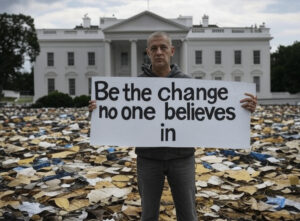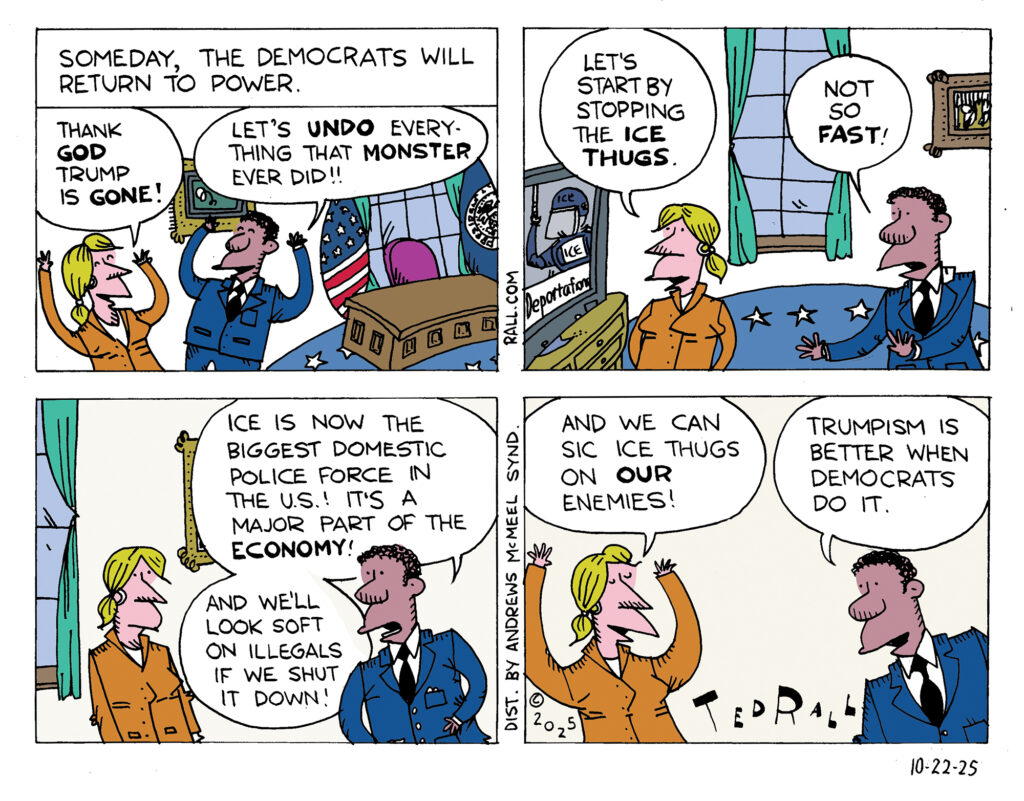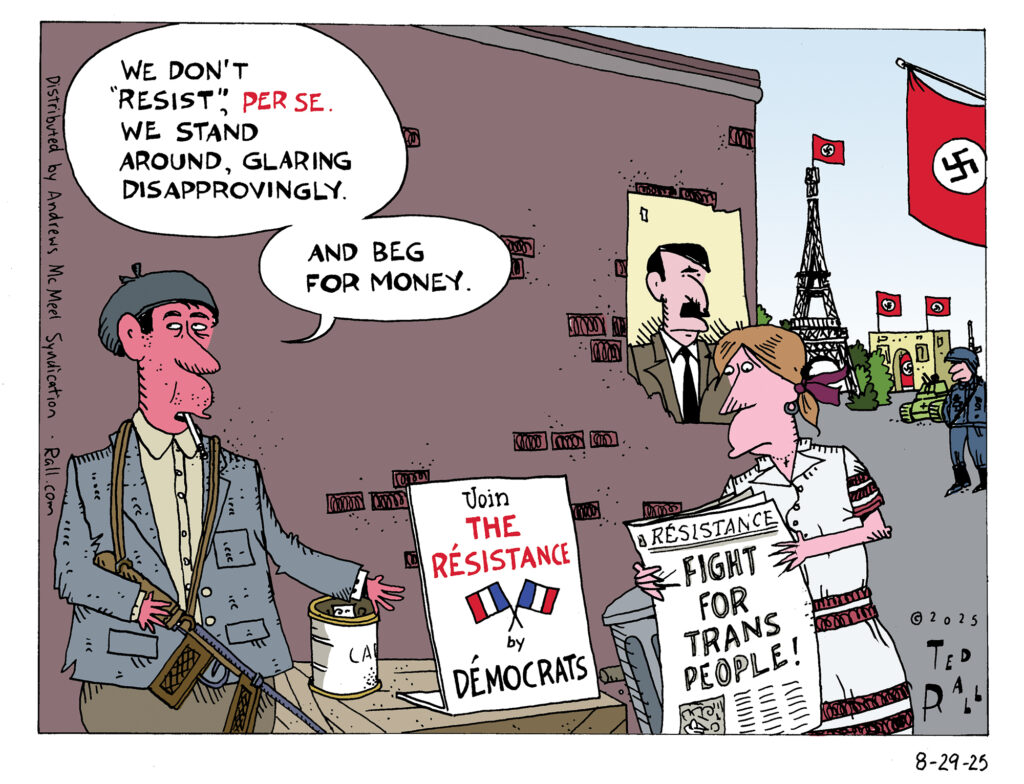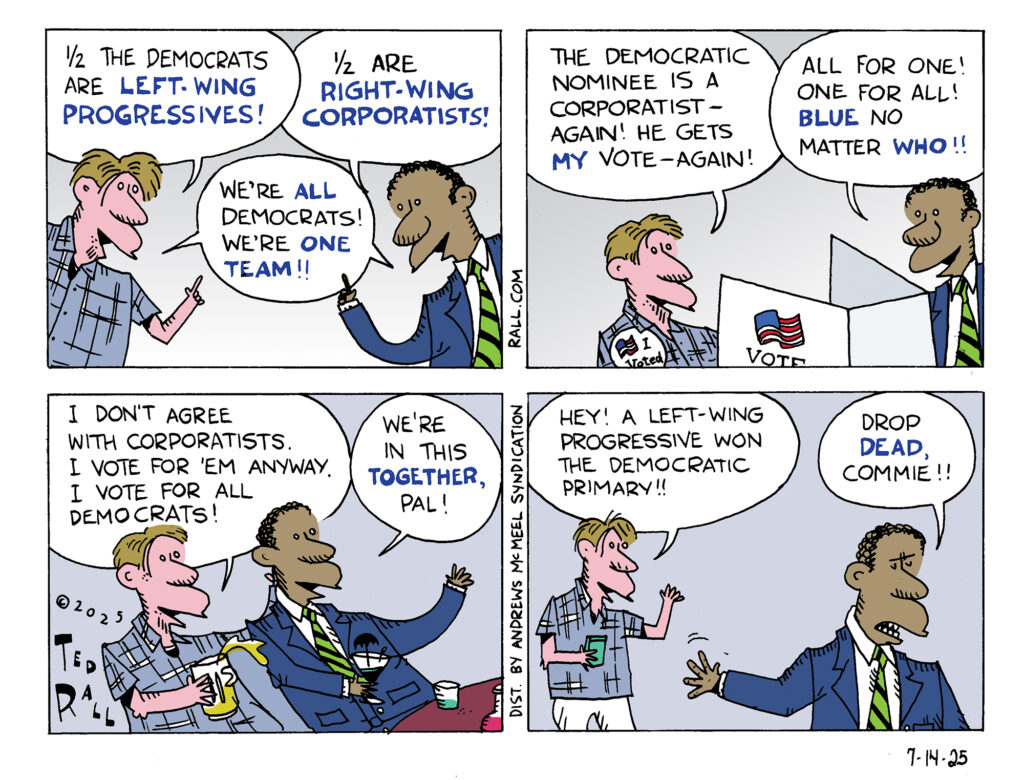Democrats say and think they’ll stop ICE from abusing alleged illegal immigrants if and when they return to power. If history repeats itself, however, there is no reason to believe that. After all, Obama told Bush’s torturers they would never be held accountable.
Finally, Democrats Lead Into Action!
Americans are suffering from all sorts of serious problems. They don’t earn enough, and their expenses are too high. They can’t afford to send their children to college or pay for healthcare. America is also responsible for problems overseas. For example, it is currently enabling genocide in Gaza. Democrats don’t have anything to say about any of these issues. However, when Texas Republicans unveil a sleazy scheme to abuse redistricting in order to gerrymander Congress in their favor by a few seats, leading Democrats like Gavin Newsom leap into action and declare war. Priorities.
Wrong-Voting Disaster Victims
After massive floods killed more than 100 people in Texas Hill Country, some coastal progressives blamed the victims, assuming most were Trump-supporting Republicans who voted against climate change legislation and warning systems that might have reduced the death toll. Similarly, when Californians die in mudslides or earthquakes, victims are often blamed for choosing to live in such areas. Aside from being insensitive and cruel, this rhetoric is inaccurate; surely some of the flood victims in Texas were Democrats.
Vote Blue No Matter Who, Unless It’s Mamdani
The Democratic Party is divided into two factions: left-wing progressives, such as Bernie Sanders and Alexandria Ocasio-Cortez, and right-wing corporatists, such as Joe Biden and Chuck Schumer. Corporatists control the party, so most nominees are corporatists. They urge progressives to remain loyal and “vote blue no matter who” to defeat Republicans. However, when a progressive secures the nomination, corporatists often refuse to support them and may even align with Republicans to undermine them. This happened to Bernie Sanders and is now happening to Zohran Mamdani in New York City. The Democratic Party is only unified in one direction.
What’s Wrong with the Democrats? They Need More Democracy
What’s wrong with the Democrats and how can the party be fixed? When an insurgent outsider candidate from the party’s progressive left defeats a moderate endorsed by the establishment, Democratic leaders reject the results and deny the will of their voters. They refuse the infusion of new ideas and tactics every organization needs to evolve. They anger their voter base. They lose elections they should have won.
It’s time for Democrats to democratize their party.
Democrats’ top-down leadership style is currently being deployed against Zohran Mamdani, the democratic socialist winner of New York City’s mayoral primary who defeated corporate favorite Andrew Cuomo. The primary results came in over a week ago, yet none of the party’s big guns—Obama, Schumer, Jeffries, Pelosi, Buttigieg, Newsom, Harris, DNC chair Ken Martin—has endorsed Mamdani. Ever the happy warrior, Mamdani says he’s grateful for the kind words he has received from his ideological fellow travelers Bernie, AOC and other members of The Squad. But the establishment’s silence is hypocritical—when the primary winner is a centrist like Biden, the Left is expected to fall in line—and telling.
Not so behind the scenes, the top Democrats who are not that into democracy are following the backroom skullduggery deployed against Howard Dean, Dennis Kucinich and Bernie Sanders. Eric Adams, the incumbent mayor elected in 2021, opted out of the Democratic primary due to his rock-bottom approval ratings amid federal corruption charges, which Trump’s DOJ dropped in exchange for opening his sanctuary city to ICE deportation operations. Yet he’s still running for reelection in the general election, as an independent under his one-man “End Anti-Semitism” line. Adams’ base is big business and Zionists. Cuomo is currently running too.
There’s a Republican, too—Curtis Sliwa, founder of the Guardian Angels. But he’s not a major factor in an 11% Republican city.
Billionaire Trump supporter Bill Ackman, hedge fund manager Daniel Loeb, former hedge fund executive Whitney Tilson, Kathy Wylde of the Partnership for New York City, along with the Murdoch-owned New York Post, want the disgraced Cuomo and the marginal Sliwa to step aside and consolidate the anti-Mamdani vote behind the disgraced Adams.
Even with the Post’s rabid attacks (“Socialist Mamdani Wants to Pay for Government Grocery Stores with Money That Doesn’t Exist,” “Zohran Mamdani’s ‘No Billionaires’ Dream Fits His Goal — To Make Us All Live in Equal Misery,” “With Code Words and Dog Whistles, Mamdani Puts a Pretty Face on Hate”), it’s too early to tell whether Adams’ unlikely alliance of Wall Street and Black voters can defeat Mamdani. But primary winners tend to perform better in general elections when their party is united. Support from party bosses is essential.
Obama’s opposition to the Iraq War and appeal to young and minority voters positioned him as an outsider challenging the party’s entrenched leadership in 2008, when he challenged Hillary Clinton in the primaries. His diverse coalition and fundraising prowess forced the DNC to embrace him. They won.
Similarly, party leaders got behind AOC and Squadsters Rashida Tlaib, Ilhan Omar, Jamaal Bowman and Cori Bush after they won their congressional primaries. All won.
DNC sandbagging of Bernie had mixed results. The first time, in 2016, it led to Hillary’s defeat in a contest Bernie would have been likelier to have won. Biden/Harris, the establishment choice, prevailed in 2020 but progressives who sat out contributed to the vice president’s defeat in 2024.
Though they constantly characterize Republicans as enemies of American democracy, Democrats who want to democratize their party should consider emulating their rivals. With fewer superdelegates who skew primaries toward the establishment, the GOP is structurally representative of its voters. And its party leaders tend to set their personal preferences aside when voters prefer an insurgent outsider.
The results confirm Newt Gingrich’s observation that “by definition, the person who learns enough to become the nominee is almost certainly the best person for the general election.”
Donald Trump, a businessman and reality-TV personality with no political experience, entered the 2016 primary on a lark and defeated establishment favorites Jeb Bush and Marco Rubio. Stalwarts like Mitt Romney and Paul Ryan opposed Trump but, in the end, pragmatism prompted acceptance and a unified GOP defeated Hillary.
Arnold Schwarzenegger, another political novice, ran in the 2003 California gubernatorial recall election. State GOP bosses preferred conservatives like Tom McClintock and Bill Simon because Schwarzenegger’s moderate politics (pro-choice, environmentalist) made him an outsider. After Schwarzenegger won 48.6% of the vote in a crowded field, GOP leaders fell into line. He won two terms.
In another insurgent campaign Rand Paul, a libertarian ophthalmologist, won the 2010 GOP Senate primary. Mitch McConnell and other Kentucky party bosses had backed Trey Grayson. The party embraced him to co-opt his Tea Party base. Paul holds a steady seat. J.D. Vance, Marco Rubio, Ted Cruz and Dave Brat of Virginia all followed the path of the outsider who defeated establishment-backed candidates and were nevertheless accepted by the party hierarchy.
Like Democrats, Republicans lose when they fail to coalesce behind their insurgent primary victors. Some state Republican officials were displeased when former news anchor Kari Lake, a former news anchor, defeated establishment-backed Karrin Taylor Robson in the 2022 Arizona gubernatorial primary. The RNC supported her but it wasn’t enough. A similar fate befell Sharron Angle and Christine O’Donnell in their 2010 Senate races in Nevada and Delaware, respectively.
History is clear. The smart move for Democrats is to unify behind their winning primary candidates, whether they are establishment favorites or progressive insurgents. New York and national Democrats should endorse, fund and campaign Zohran Mamdani.
(Ted Rall, the political cartoonist, columnist and graphic novelist, is the author of “Never Mind the Democrats. Here’s WHAT’S LEFT.” Subscribe: tedrall.Substack.com.)
DMZ America Podcast Ep 195: Dems Finally Admit Biden Was Senile
Live at 12 noon Eastern/11 am Central time, and Streaming 24-7 Thereafter:
Now that Biden is out, Democrats who repeatedly dismissed claims of his dementia are shifting their stance, prompted by mounting evidence and political fallout. CNN’s Jake Tapper and Axios’ Alex Thompson’s upcoming book, “Original Sin: President Biden’s Decline, Its Cover-up, and His Disastrous Choice to Run Again,” set for release on May 20, exposes a alleged “cover-up” of Biden’s “serious decline,” based on over 200 interviews with insiders. The book highlights how Biden’s team concealed his diminishing faculties, a narrative Democrats now grapple with post-2024 election loss.
Top figures like Nancy Pelosi and Chuck Schumer, once silent or defensive, are implicated as likely aware of the truth, per sources like the Wall Street Journal. Even Barack Obama is suggested to have suspected Biden’s condition, yet the party maintained a united front. Tapper, previously downplaying concerns, now frames Biden’s re-election bid as “narcissistic” and “reckless,” signaling a broader Democratic reckoning as they distance themselves from the cover-up narrative they once rejected. This shift reflects both self-preservation and acknowledgment of a deception that cost them politically.
The Incredible Vanishing Liberals
 For this essay, let’s not debate the pros and cons of our new old president. Detailing specific reasons that many Americans are upset with/scared of/annoyed by Donald Trump and the Republican Party would be a distraction from a point that desperately needs to be made. Suffice it to say, millions of people are angry, disappointed and would prefer entirely different political policies and priorities out of Washington.
For this essay, let’s not debate the pros and cons of our new old president. Detailing specific reasons that many Americans are upset with/scared of/annoyed by Donald Trump and the Republican Party would be a distraction from a point that desperately needs to be made. Suffice it to say, millions of people are angry, disappointed and would prefer entirely different political policies and priorities out of Washington.
The fact that we should linger upon is this: Many, many liberals feel very, very impotent. And this should be a major cause of concern.
When Republicans celebrate their win by mocking their opponents, they’re whistling past the small-d democratic graveyard of history. Winning an election is good. Crushing your opponents’ political will to live is dangerous.
For liberals, there is a lot not to like about politics since January 20th. Trump has signed a blizzard of sweeping executive orders on a myriad of controversial issues. His administration is attempting a radical revamp of the relationship between the American people and their government, much of it carried out by a brash break-things-move-fast tech-bro billionaire. Given the high stakes and the polarizing nature of the issues involved and that Trump’s approach is so radical, resistance should be expected from both Democratic politicians on high and street demonstrations from the grassroots.
Instead, Democrats at all levels have been compliant and largely silent. Pennsylvania Governor Josh Shapiro, a centrist Democrat, complains: “[Congressional Democrats are] failing to do what is their fundamental responsibility constitutionally—to be a check.” Republicans barely control the Senate, yet all of Trump’s nominees have been approved. Democrats even voted unanimously to support a far-right neocon, Marco Rubio, as secretary of state.
Activists have been passive. There have only been sporadic protest marches. Trump’s proposal to annex and ethnically cleanse Gaza, a would-be war crime, elicited little measurable reaction from the anti-imperialist Left, certainly no protests analogous in size to last year’s pro-Palestinian campus protests. Compared to the antiwar movement of the 1960s and similar demonstrations opposing Reagan, attendance at marches has been anemic. Seven out of ten Democrats are tuning out political news. Liberal-leaning cable news networks CNN and MSNBC have seen their ratings plummet and are shaking up their line-ups.
Democratic donors, taking note of the disarray, are closing their checkbooks. “[Democrats] want us to spend money, and for what? For no message, no organization, no forward thinking,” a donor told The Hill.
When a substantial portion of a republic’s population believes that there is nothing it can do to influence political leaders, the system is in trouble.
With Trump barely a month into his second term, history may record Democrats’ current beaten-down-dog mien as a momentary blip preceding a spurt of determined reenergization and a journey to recovery, reinvention and future victory. A devastating 1964 defeat left the GOP crestfallen and depressed. “Barry Goldwater not only lost the presidential election yesterday but the conservative cause as well. He has wrecked his party for a long time to come; it is not even likely to control the wreckage,” James Reston wrote in The New York Times on November 4, 1964.
He was wrong. Ray Bliss, chair of the Republican National Committee Chairman from 1965 to 1969, led the GOP out of the wilderness by patching up ideological divides and organizing at the local level. Nixon won in 1968—barely—and a landslide in 1972. Reagan shaped much of the way government looks today.
But Democrats don’t seem likely to pull off such a trick. As they say in 12-step programs, the first step is admitting you have a problem. The party is addicted to campaign contributions from corporations like Big Pharma and Big Tech who influence it against doing much to appeal to the working-class voters they need to win elections and are migrating to Trump and the Republicans. But there’s no evidence they see that as a problem. Some top Democrats want to wean themselves off big corporate money by adopting Bernie Sanders’ proven small-contributor model, but the only suggestion we’ve heard from new DNC chair Ken Martin is that the party needs more and better messaging.
“We also need to give people a sense of who we are as Democrats, what we believe in and what we’re fighting for,” Martin said on February 17th. While Democrats say they oppose Trump, they don’t seem to believe in much at all. They’re not fighting, whether for or against anything. Don’t take my word for it. Listen to them: “The courts,” Senate Minority Leader Chuck Schumer says, “are the first line of defense” against Trump.
What of the Senate, where Democrats hold seven more seats than needed to jam up legislation with filibusters? They’re abdicating their checks and balances to the judiciary.
If you’re a liberal voter, the ideological battlefield currently looks like the Ukrainians’ situation. You keep losing. You’re deploying the same old failed strategies and tactics. No new miracle weapons are coming. There’s no reason to think that anything will improve.
Liberals see that there’s no hope. So they’re alienated and checked out.
So Trump runs wild and the streets remain empty.
If you’re conservative, the prospect of a Great Liberal Vanishing should spook you. In late-stage Rome, citizens got tired of politics and allowed themselves to be distracted by bread and circuses. The Republic slid into autocracy. German liberals disengaged from Weimar Republican politics as the SPD, the dominant left-leaning party at the time, governed in a coalition with bourgeois parties who blocked attempts to address popular priorities like unemployment relief after the depression began in 1929. In our time, low voter turnout correlates with stagnant governance and populist takeovers—and U.S. elections begin with a lower turnout rate than many other countries.
A democratic republic can limp along, hollowed out, for a while. But the less people care about the system, the easier it is for a demagogue to step in and claim, “I alone can fix it.” By then, no one’s paying attention.
(Ted Rall, the political cartoonist, columnist and graphic novelist, co-hosts the left-vs-right DMZ America podcast with fellow cartoonist Scott Stantis and The TMI Show with political analyst Manila Chan. Subscribe: tedrall.Substack.com.)
A Movement Beats a Party Every Time
 As Democrats continue to deconstruct the root causes of their recent defeat and attempt to regroup for next year’s midterm elections, they might want to consider a new factor in American politics: the seductive power of a movement compared to a boring old party.
As Democrats continue to deconstruct the root causes of their recent defeat and attempt to regroup for next year’s midterm elections, they might want to consider a new factor in American politics: the seductive power of a movement compared to a boring old party.
On the surface, the 60th American presidential election was the usual two-way contest between the Democratic and Republican parties. But, as Democrats tried their best to run as normal and competent a campaign as they could despite Biden’s ill-timed withdrawal, Trump had re-branded and re-organized the Republican Party as a vessel of his MAGA movement.
A movement is dynamic. Its number-one goal is building excitement and a sense of belonging.
A party strives for constancy. It represents a set of principles through thick and thin.
All things being equal, a movement beats a party.
“The difference between parties and movements is simple,” the progressive pundit David Sirota wrote back in 2009. “Parties are loyal to their own power regardless of policy agenda. Movements are loyal to their own policy agenda regardless of which party champions it.” Democrats who were skeptical of military interventionism under Bush embraced it under Biden yet remained Democrats; the abortion-rights movement would vote Republican if the GOP were to come out as firmly pro-choice.
Donald Trump has scrambled Sirota’s formulation.
Trump has built a highly-personalized movement detached from any discrete policy prescription. Rather than remain independent of party politics, his MAGA movement seized control of the Republican Party. Despite having achieved a sweeping victory, MAGA continues to act like an outsider insurgent movement.
Personality is everything. The dauphin J.D. Vance notwithstanding, it is impossible to imagine the MAGA movement without Trump. While I don’t give much credence to arguments that the president is a Nazi-in-waiting, there is an echo of the Führer Principle that gave the force of law to anything Adolf Hitler said. MAGA Trumpism is anything that Trump says at any given time.
At first glance at the man on the golden escalator in 2015, this highly individuated politics seems ill-fated. Trumpism is riddled with internal contradictions and existential hypocrisies. Trump’s habit of reversing himself, as he did recently by threatening Russia only to turn around and embrace it after a call to Putin seems destined, by traditional political standards, to turn off supporters who care about those issues. So does the conflict between his personal and political lives; surely evangelicals will turn against a crude serial adulterer who screws porn stars and doesn’t appear to have ever darkened the door of a church in session.
People who evaluate Trump by traditional metrics fail to understand that everything has changed. For a party, Trump’s inconsistencies and changing his mind 180° would be weaknesses to overcome or explain away. Not so for a movement. First and foremost, a movement moves. Where and how it moves is beside the point.
A movement is entertaining. Think about Trump and his wild and crazy rants, not as appalling or racist but as unpredictable—and thus interesting. Think about Trump supporters and their giant flags, their sense of community.
Trump kept holding rallies throughout his first term—a party doesn’t do that. A movement does. A party doesn’t stick with an individual politician through thick and thin, as Trump supporters did through his legal troubles. A movement does. It has to, because it’s all about one man.
If there is a 20th century authoritarian parallel to Trump, I have argued before, it is not the totalitarianism of Hitler but the culturally-centered rule of Mussolini. As the Italian novelist and semiotician Umberto Eco, who grew up under Italian fascism, noted, “Contrary to common opinion, fascism in Italy had no special philosophy.” Mussolini, who started out as a socialist journalist, came to believe that people were drawn to action—any action—for its own sake. “Action being beautiful in itself, it must be taken before, or without, any previous reflection,” Eco wrote in an influential essay about fascism in 1995. “Thinking is a form of emasculation.”
Writing at Salon, Chauncey DeVega complains: “President Trump and his MAGA Republicans and their forces are smashing American democracy, the Constitution, the rule of law, the institutions and norms. Trump has enacted over 50 executive orders since Jan. 20, the most in a president’s first 100 days in more than 40 years. Some of the most egregious ones are blatantly unconstitutional and violate current law.” DeVega blames the media for normalizing Trump and Democrats for not taking him seriously enough to convince voters.
What such mainstream analyses dismiss is how soul-deadening the technocrats who run the West have been. Not only have they been unresponsive to people’s complaints about internationalism and declining living standards, they have been boring.
Democrats (and many Republicans) have repeatedly run on not promising anything. The only surprise is that they got away with it for so long.
Whether Trump is influenced by Mussolinian tactics, or his acute political instincts rediscovered the potency of a “cult of action,” the United States was primed for the politician Trump had become by the time he ran a third time in 2024—energetic, focused, retributive, imaginative—and stormed out of his inaugural ceremony with a blizzard of pardons, sweeping executive orders and bold diplomatic initiatives.
Asked if she would have done anything differently than Joe Biden during his presidency, Kamala Harris said: “There is not a thing that comes to mind.”
And, four years earlier, Biden told a group of wealthy campaign donors that, were he to be elected, “Nothing would fundamentally change.” Turns out, he was truthful. Nearly a third of those who voted for him in 2020 didn’t turn out for Harris in 2024.
Liberal Democrats I talk to are depressed and disengaged in this, the first month of the second term of Trump. They’re also jealous. Why, they ask, won’t the Democrats run a candidate who campaigns and governs as aggressively as Trump is doing now?
As for those Democrats, the party faces a choice as it prepares to challenge MAGAism. It can reconstitute itself into something that looks and feels more like a movement, far less careful and far more energetic. Or it can keep going as a party that promises that nothing will ever fundamentally change.
(Ted Rall (Twitter: @tedrall), the political cartoonist, columnist and graphic novelist, co-hosts the left-vs-right DMZ America podcast with fellow cartoonist Scott Stantis and The TMI Show with political analyst Manila Chan. His latest book, brand-new right now, is the graphic novel 2024: Revisited.)






